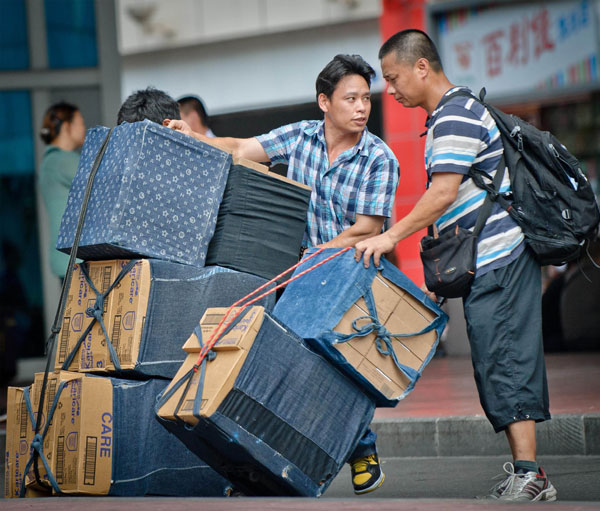Foreign milk powder still pricey
 0 Comment(s)
0 Comment(s) Print
Print E-mail China Daily, June 15, 2012
E-mail China Daily, June 15, 2012
 |
|
Two men take care of boxes containing foreign milk powder products brought from Hong Kong outside the Luohu Port in Shenzhen, Guangdong province, on May 24. [ Photo / Xinhua ] |
Chen Zhuolin, a 27-year-old mother of a baby girl, always feels lost when she strolls along shelves filled with milk powder for babies.
The milk powder brands, produced in China or imported, vary so much in price.
"I prefer to buy foreign brands because of their superior quality, but the prices are much higher than what I had expected. Most of them are about 300 yuan ($47) for a can," she said.
In early April she brought two cans of Friso milk powder, imported from the Netherlands, in a Hong Kong supermarket at 182 yuan for a 900-gram can.
"It's at least 50 yuan cheaper for each can than in Shenzhen supermarkets," she said. "Why are the prices of the same brands higher on the mainland?"
She is not the only one who has noticed the price difference of imported milk powder. Besides Friso, many imported brands also sell at a higher price on the mainland.
For instance, Toepfer, an organic milk powder brand from Germany, sells each 600-gram can for newborn babies for about 79 yuan, according to the company's website. In licensed online shops in China, the price of the same powder reaches 258 yuan a can.
"More expenses are needed in transportation, customs clearing, promotion and other places, which pushes up the price of imported milk powder in China," said Miao Dandan, a saleswoman at Beijing Baihuibio, Toepfer's general agent in China.
But some experts said they could not agree with such an explanation, citing Chinese customers' low confidence in the quality of domestic brands and the pursuit of maximum profit by dairy product importers.
However, milk companies have to spend a considerable amount of money to place their products, and extra costs can include as many as 27 charges, for example, the entrance fee to supermarkets, said Wang Dingmian, former vice-chairman of the Guangdong Dairy Association.
"But they have already raised their product prices many times in the past five years, making it still a high-margin business," Wang said.
Chen Lianfang, an analyst in a Beijing-based agricultural consulting firm, agreed with Wang, saying the price of a can of imported milk powder has increased by at least 50 yuan since the exposure of the melamine scandal in 2008.
The imported brands account for an increasingly large part of the Chinese market, and their market share might have exceeded that of domestic ones in 2011, according to the dairy management office under the Ministry of Agriculture.
"Famous foreign brands may account for 60 to 70 percent of the middle- and high-end market this year, gaining them a favorable environment when deciding the price," said Chen Lianfang, adding that China's milk powder market is estimated to exceed sales of 45 billion yuan in 2012.
Data from the General Administration of Customs said that in the first quarter of this year, about 193,000 tons of milk powder was imported into China, an increase of 17.6 percent from the previous quarter.
Chen, the young mother, said that the thought of buying domestic brands for her baby has never come to her mind.
"Though the domestic brands have been making efforts to improve quality, I still don't believe them. My friends don't buy domestic brands, either."
The family pays about 500 yuan a month for milk powder.
"But no matter how high the price is, I'll buy my baby the best," she said.






Go to Forum >>0 Comment(s)